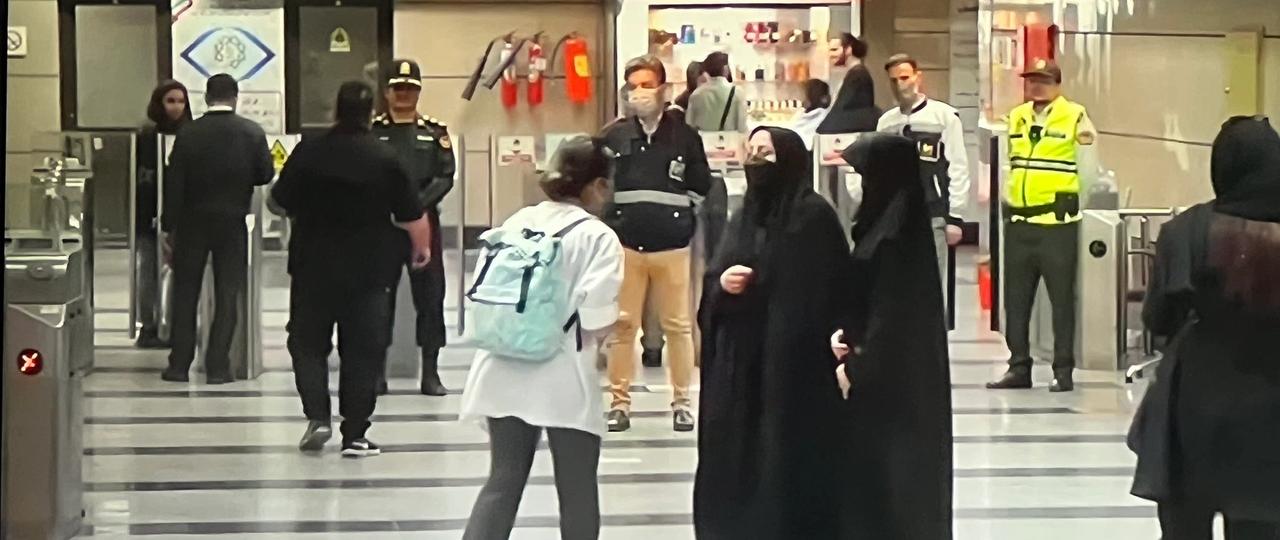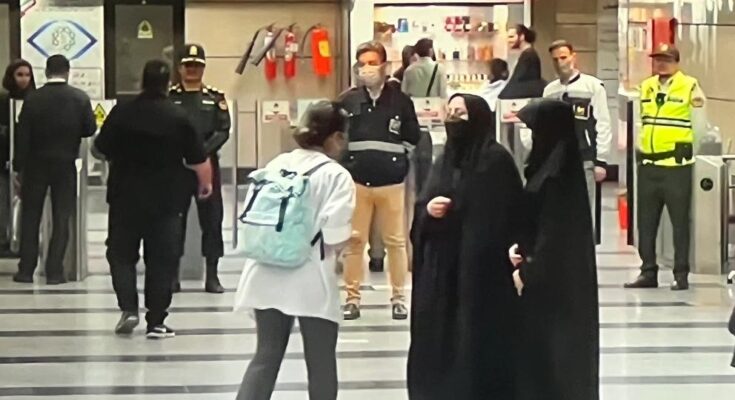By Maryam Sinaee
Source: Iran International

The use of “jihadi groups” to enforce hijab rules has turned the capital’s metro stations into a battleground with women who are refusing to wear the hijab.
Videos circulating on social media show black-veiled women warning female passengers over hijab and plainclothesmen and uniformed agents standing at the ticket gates preventing the women who ignore the warnings from passing through the ticket gates.
Tehran’s mayor, Alireza Zakani, said at a city council meeting Sunday that the municipality has formed a special uniformed security unit to stop unveiled women from passing through the ticket gates.
“We will proceed according to the country’s laws in this regard. Our first step is issuing notices, then we issue warnings to the unveiled [women], and in the third stage, we prevent them from entering the metro stations,” Zakani said.
Hijab enforcement at Tehran metro.
اجرای طرح عفاف و حجاب در ایستگاههای مترو تهران pic.twitter.com/ppwopappRh
— روزنامه اینترنتی فراز (@FarazDaily) April 28, 2023
Social media users say arguments break out very frequently between hijab-defying women and their companions with hijab enforcers. The battle continues even after women pass through the ticket gates and onboard the train, where arguments often break out between vigilantes and hijab enforcers with women who remove the veil after passing the checkpoint.
As a last measure, Tehran municipality has installed screens between the metro cars allocated to women and other cars that can be used by men or both genders. Zakani claimed that installing such screens started in Tehran and “is now being copied by other countries,” without mentioning which countries have done so.
The main reason for installing screen barriers is preventing men from entering the cars allocated to women and harassing them,” Mayor Zakani claimed.
The CEO of Tehran Metro, Masoud Dorosti, said the installation of the screens had started in early March and such screens would be installed in all metro trains within the next few weeks.
Dorosti claimed that the screens, which he called “retaining doors”, were installed by popular demand and have been welcomed.
#mahsaAmini #مهسا_امینی
The images published on social media show that the officials of the Tehran metro have installed curtains between the women’s cars and other cars in some metro cars in the latest act of gender discrimination and imposing the hijab.
@📡 (1/3) pic.twitter.com/jm5ok511dx— Vahid Online English (Beta) (@VahidOnlineEng) April 30, 2023
Referring to the installation of the screens in an article entitled “Living the Magic Realism” Monday, Mehdi Afrouzmanesh, deputy editor of the reformist Ham Mihan newspaper, said it is unbelievable that the authorities have resorted to such measures. Installing screens between metro cars and other things that happen in Iran are like Gabriel Garcia Marquez’s surrealistic stories in which things that are hard to believe but not impossible happen, he wrote.
As another example of such unbelievable happenings, he mentioned the declaration of President Ebrahim Raisi’s deputy in women’s affairs, Ensieh Khazali, “who, as the person in charge of improving the quality of women’s life, said proudly that she married when she was sixteen.”
Woman playing a song on harmonica at a Tehran metro station unveiled as an act of protest.
سلام توانا، این دختر شجاع در ایستگاه مترو ایستاده بود و سازدهنی میزد، در حالی که مامورها همون موقع در ایستگاه حضور داشتند. اونجا دوربین بود، فیلم میگرفتند، ولی این دختر ترسی نداشت. من و چند نفر دیگه هم با وجودی که ترسیده بودیم، شهامت پیدا کردیم و بدون حجاب اجباری (با حجاب… pic.twitter.com/J0tJOKysUM
— توانا Tavaana (@Tavaana) April 30, 2023
In the past few weeks authorities have sealed thousands of businesses including restaurants, cafes, tourist accommodations, retail shops and even a counselling clinic and a gym — in Tehran and other cities for women’s refusal to wear the compulsory hijab.
Several shops in Opal mall, a massive modern shopping center with over 450 businesses in Tehran, which was shut down last week were sealed again Sunday immediately after the mall’s re-opening. According to the reformist Shargh daily, the closure of the mall had resulted in the loss of around 2,500 jobs.
The recent campaign to enforce hijab rules has caused some violent incidents involving pro-hijab vigilantes and women who defy it. A 60-year-old woman had a cardiac arrest this week when a fight broke out between vigilantes and members of her family over hijab.




